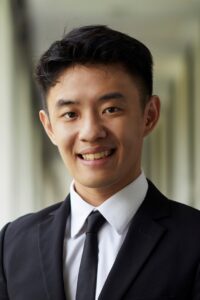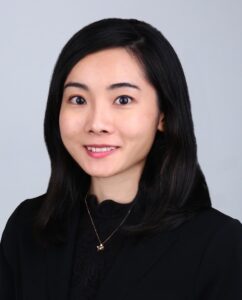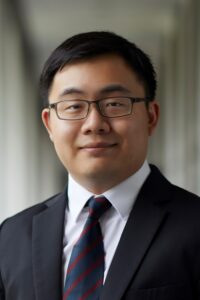Media - News
- Media
- The Sheridan Fellowship: A Bridge to Academia
The Sheridan Fellowship: A Bridge to Academia
The Sheridan Fellowship Programme aims to develop talented young lawyers into academics fit for tenure track positions within NUS Law. Now inviting applicants for its tenth intake, the Programme has produced many promising academics over the years, including Assistant Professor Tan Zhong Xing ’12 who received the Hart Publishing Prize in 2018, and Assistant Professor Benny Tan Zhi Peng ’12. Both Zhong Xing and Benny are frequent recipients of teaching excellence awards at NUS, at the Faculty and University level.
NUS LawMatters quizzed three of NUS Law’s newest additions to the Programme to find out the inside scoop on life as a Sheridan Fellow.

Marcus Teo ’18 was appointed as a Sheridan Fellow in 2021 and was previously a researcher at NUS’ Centre for International Law. He teaches and researches in public law and private international law, and his work has been published in leading generalist and specialist journals, such as the Cambridge Law Journal, the International & Comparative Law Quarterly and the International Journal of Constitutional Law. His current research focuses on substantive review in administrative law, the proof of foreign law in private international law, and the relationship between private international law, public international law and constitutional law.

Hillary Chua holds an LLB from King’s College London and a Master of Bioethics from Harvard Medical School. She was called to the Singapore Bar in 2018, and practised medical law prior to joining NUS as a Sheridan Fellow in 2021. Her research interests are in medical law and ethics, and disability law.

Joseph Lau, LLM (IP & Technology Law) ’19 was appointed as a Sheridan Fellow in 2022 after serving as a teaching assistant for the Law of Torts, and holds appointments as an Academic Fellow at the Centre for Technology, Robotics, Artificial Intelligence and the Law (TRAIL) and as Faculty Advisor for Alt+law, a student interest group focused on legaltech. His research interests lie in the fields of copyright and patent law and his work in these areas has been published by leading local and international journals, including the Singapore Academy of Law Journal, the Australian Intellectual Property Journal and the Intellectual Property Quarterly.
How did you come to choose a career in academia?
Marcus: I’ve always loved thinking about puzzles and writing, and I’ve always wanted to do something creative with my life. My top two choices were either to be a singer-songwriter or an academic. So upon discovering that I had no inherent talent for the former – and that the latter was more fun than I initially thought – the choice was obvious!
Hillary: I’ve always been more inclined towards academia rather than practice. In law school, I preferred essay questions to hypotheticals, and enjoyed analysing issues in medical law and ethics. However, I wanted to gain relevant practice experience first, and after about two years of practising medical law, I felt that the time was right to move into academia.
Joseph: I didn’t initially! I actually started out in commercial litigation. But my years there made me realise that what I truly enjoyed was legal research – really digging into a legal issue and thinking not just about what the law is, but also what, for reasons of policy or principle, it should be. Of course, for understandable reasons, the extent to which you can do that in practice is limited, so that drove me towards changing tracks and going into academia.
Best perks of the job?
Marcus: The freedom to choose your projects to fit your passion, and to call the shots over your day-to-day schedule.
Hillary: I agree with Marcus. In academia, I finally found time to write about ethical and legal issues that have been on my mind for years. Having colleagues and mentors to consult and bounce ideas off of has been immensely helpful. Teaching has also been enjoyable, and less scary than expected.
Joseph: Teaching! I truly believe that teaching is an integral part of academic life and some of the best parts of my experience in NUS so far as a staff member have been the hours spent teaching torts to the freshmen.
Biggest challenges?
Marcus: Any topic of research always seems much easier at the start than when you are in the midst of working through the nitty-gritty details of your argument. The joy – and the struggle – of research is in pulling yourself through labyrinths of your own making toward an answer that you are satisfied with.
Hillary: Freedom over my schedule – it’s a double-edged sword! It requires a lot of self-discipline to set priorities on the job. When I first started, I tried to fill my schedule with teaching, committee work, various projects… only to realise that time is limited. The effort to output ratio in research can also be discouraging. You can spend months on a draft only to throw it out or rework it substantially in response to feedback.
Sheridan Fellows teach for one semester and do full-time research in the other. During my research semester, a student jokingly asked me if the torts teachers get to slack off when they’re not teaching. That’s not true – research takes time!
Joseph: I think getting my work published and on top of that, more widely recognised, is a major challenge, one that I still grapple with.
Greatest misconception people have about academic life?
Marcus: For me personally, that professors like to mark their students badly. I think we all take great pride in our classes, and want our students to do as well as possible. It always pains me to see a bad script from a student when I know they could do much better. The challenge, then, is to figure out how we can help them realise that potential in the future.
Hillary: That you have to be the smartest student to become an academic. My early years of law school were challenging and I didn’t ace every exam. I believe that’s actually helped with teaching – having personally struggled through the material gives me a sense of how to break down concepts in a way that my younger self would have appreciated.
Joseph: I think some people might have the impression that being an academic is a softer option compared to legal practice. I think it’s more accurate to say that the challenges and rewards each option offers are different. You have to choose for yourself which path you prefer.
What is it really like to be colleagues with your profs?
Marcus: Great! We learn that our teachers are only human after all, striving to teach and research as best they can – and the understanding and appreciation we have of them is all the richer for it.
Joseph: To be honest, it was a little strange at first. My interactions with them were very formal in the first few years I spent as a Teaching Assistant – I addressed most people by their titles and not their names! Now though, it has gotten a little easier to shed some of that formality (of course, you still have to give them the respect they are due as leaders in their fields and senior figures at NUS!) and see them as colleagues, even friends.
How do you continue to survive with the limited food options at BTC?
Marcus: One of the perks of being an academic being the ability to schedule my own life (see above), I hardly eat at BTC. That said, I think the chicken rice is not to be scoffed at.
Hillary: I sometimes attend meetings and events at the medical school because of my research interests. This gives me an excuse to eat at the Science Canteen!
Joseph: The new canteen near NParks is pretty good! Sometimes if I can I drive out to the surrounding area and see what I can get – usually its McDonalds from Serene Centre.
What do you plan to do after the Sheridan Fellowship?
Marcus: I’ll be heading off to do my LLM at Cambridge later this year!
Hillary: Hopefully do a PhD… fingers crossed.
Joseph: Hopefully, I will be able to continue teaching and researching at NUS Law!

